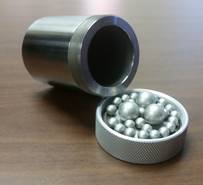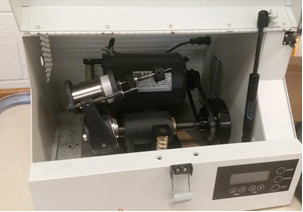Nanocrystalline Alloys and Nano-grain Size Stability
Source: Sina Shahbazmohamadi and Peiman Shahbeigi-Roodposhti-Roodposhti, School of Engineering, University of Connecticut, Storrs, CT
Alloys with grain size less than 100 nm are known as nanocrystaline alloys. Due to their enhanced physical and mechanical properties, there is an ever-increasing demand to employ them in various industries such as semiconductor, biosensors and aerospace.
To improve the processing and application of nanocrystalline alloys, it is necessary to develop close to 100% dense bulk materials which requires a synergistic effect of elevated temperature and pressure. By increasing the applied temperature and pressure, small grains start to grow and lose their distinguished properties. Thus, it is technologically important to reach a compromise between inter-particle bonding with minimum porosity and loss of nano-scale grain size during consolidating at elevated temperatures.
In this study we aim to eliminate oxygen from solid solution to improve the nano-grain size stability at elevated temperatures. Nano-crystalline Fe-14Cr-4Hf alloy will be synthesized in a protected environment to avoid oxide particles formation.
- File the high purity low oxygen content bulk materials (Fe, Cr and Hf targets) in the glove box using a reciprocating mechanical filing machine in order to minimize oxygen contamination in the starting powders.
- Load the powder mixture for a specific alloy (Fe14Cr4Hf wt.% in this study) into a stainless-steel vial along with 440C stainless steel milling balls (Fig. 1). The diameters of the milling balls are 6.4 and 7.9 mm and the ball powder-to-weight ratio is 10:1. The sealed vial needs to be kept under prot
Fig. 3 shows the XRD data for ball-milled OF-Fe14Cr4Hf annealed for one hour at 900°C. There is sharpening of the peaks along with slight peak shifts. It is due to relaxation of lattice strain as the annealing temperature rises. When the annealing temperature rises, several small peaks are revealed between the four major BCC peaks. These would indicate the formation of secondary phases.
Fig. 4a-c shows TEM images and diffraction pattern for OF-Fe14Cr4Hf annealed for 1 hour at
The experiment demonstrates how the nano-grain size stability of the nominally oxygen free nanocrystalline materials may improves compare to the alloys with significant amount of oxygen. In this study the OF powders synthesized in a protected atmosphere to minimize the interaction between oxygen and solid solution leads to increase the segregation of alloying elements to the grain boundaries and improve the thermodynamic grain size stability. TEM microscope introduced itself as a cost-effective, time-saving and powerful
Passer à...
Vidéos de cette collection:

Now Playing
Nanocrystalline Alloys and Nano-grain Size Stability
Materials Engineering
5.1K Vues

Matérialographie optique I : Préparation de l'échantillon
Materials Engineering
15.3K Vues

Matérialographie optique II : Analyse d'image
Materials Engineering
10.9K Vues

Spectroscopie photoélectronique à rayons X
Materials Engineering
21.4K Vues

Diffraction des rayons X
Materials Engineering
87.6K Vues

Faisceaux d'ions focalisés
Materials Engineering
8.8K Vues

Solidification directionnelle et stabilisation de phase
Materials Engineering
6.5K Vues

Calorimétrie différentielle à balayage
Materials Engineering
36.3K Vues

Diffusivité thermique et méthode du flash laser
Materials Engineering
13.1K Vues

Dépôt électrolytique sur films minces
Materials Engineering
19.5K Vues

Analyse de la dilatation thermique par dilatométrie
Materials Engineering
15.5K Vues

Spectroscopie d'impédance électrochimique
Materials Engineering
22.9K Vues

Matériaux composites à matrice céramique et leurs propriétés de flexion
Materials Engineering
8.0K Vues

Synthèse des hydrogels
Materials Engineering
23.4K Vues

